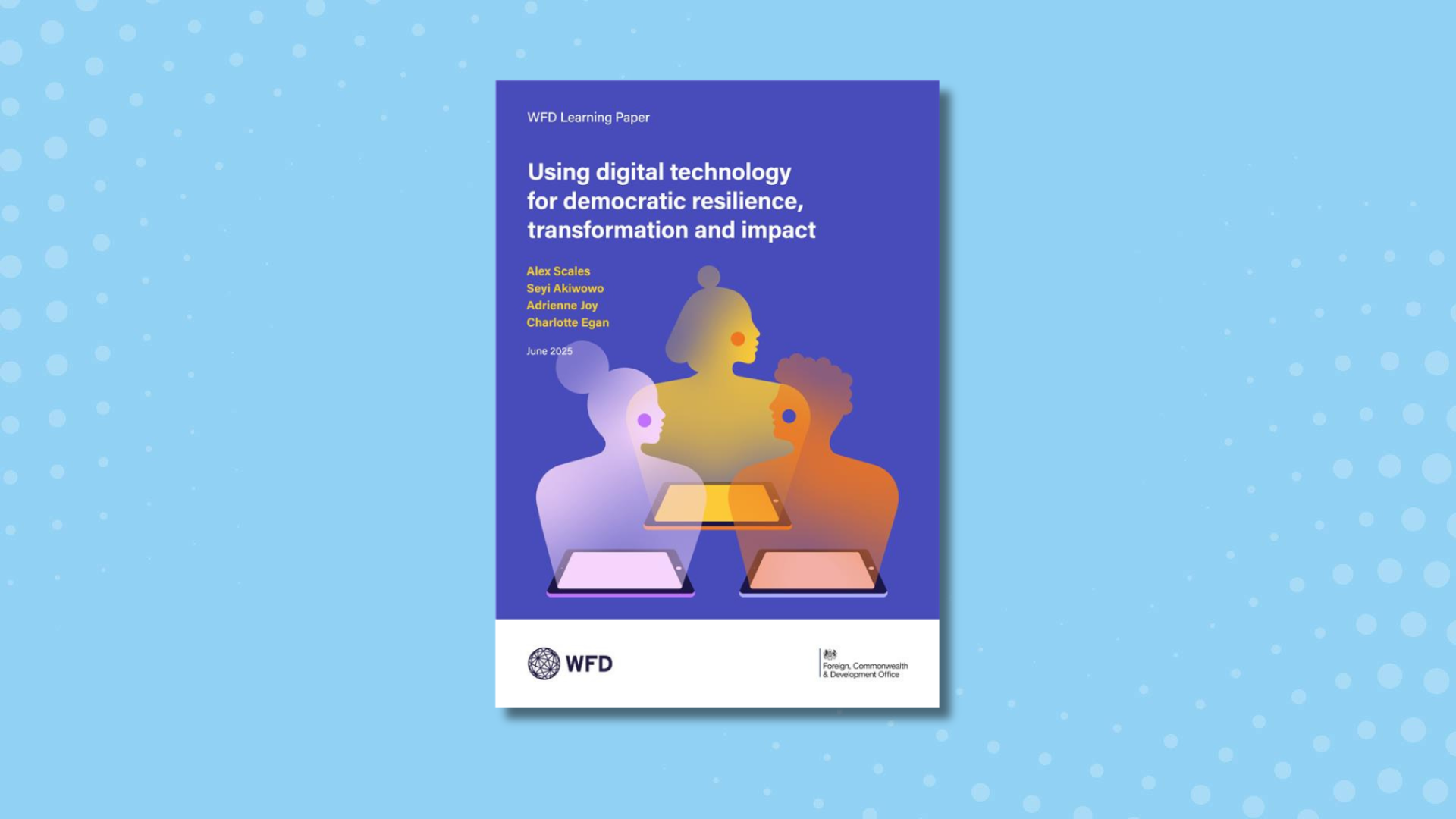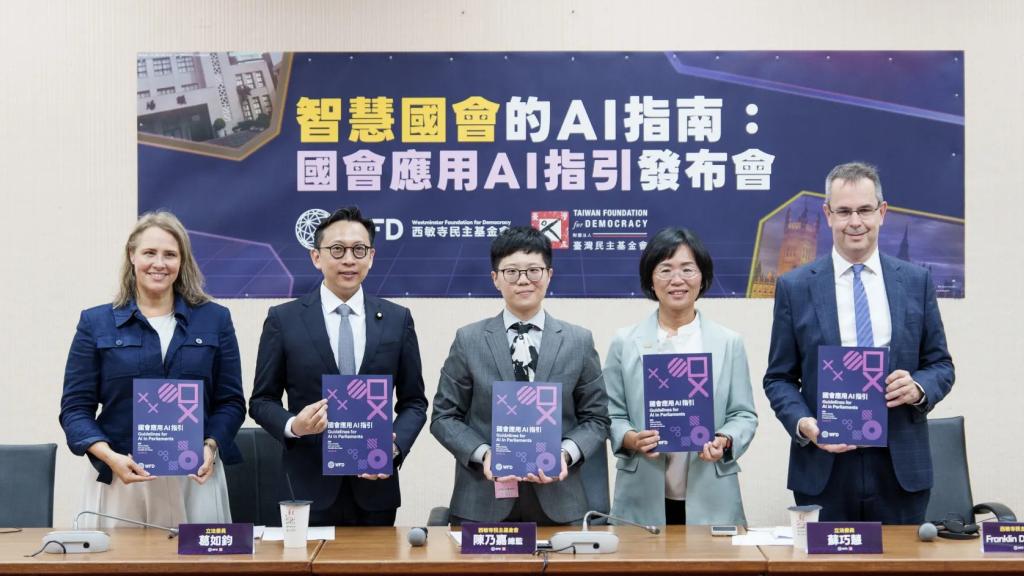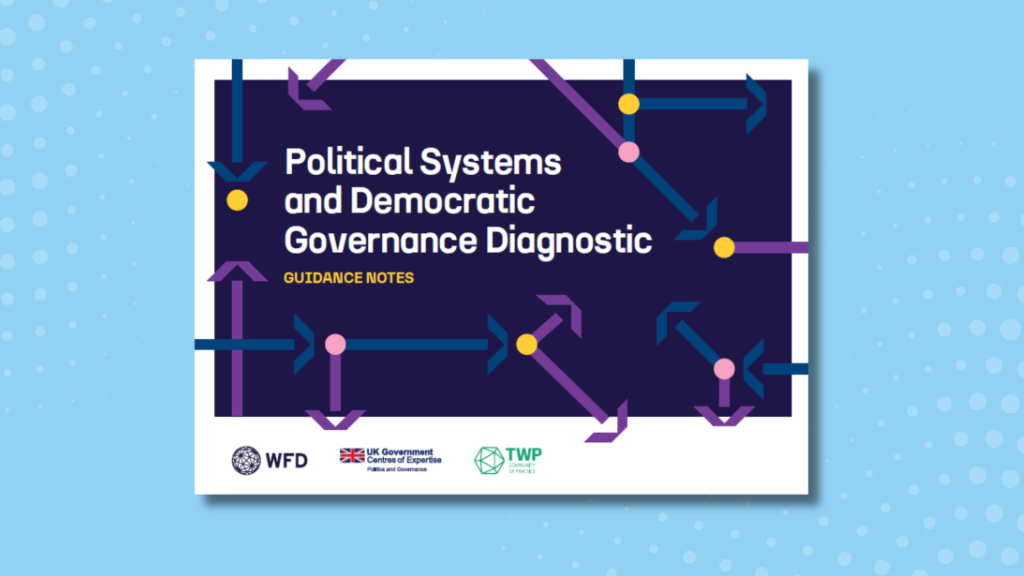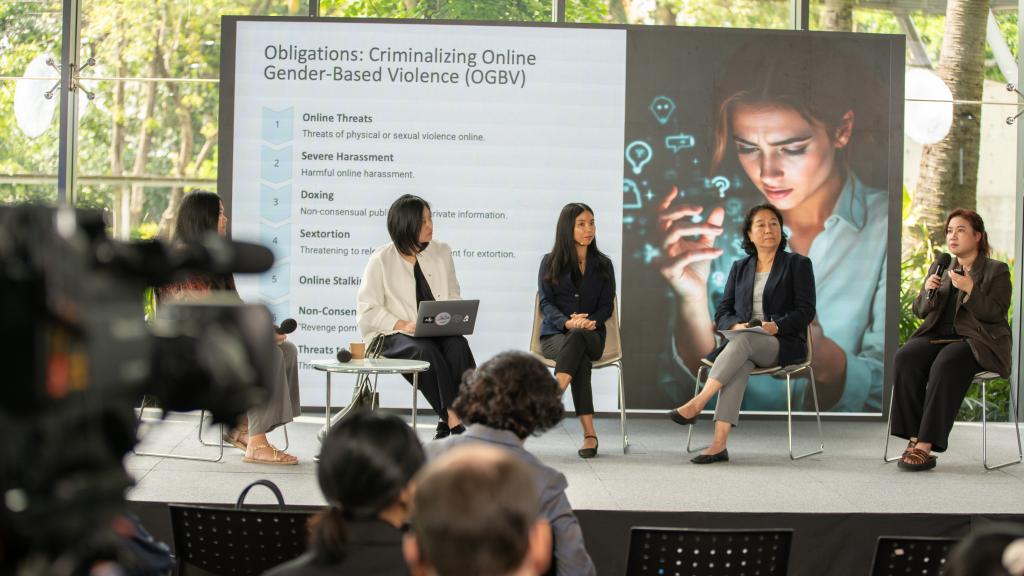
Alex Scales

Seyi Akiwowo

Adrienne Joy

Charlotte Egan
Westminster Foundation for Democracy’s (WFD) Democratic Resilience in a Digital World Programme (1 April 2024 to 31 March 2025, £130,000) aimed to build WFD’s evidence base on if, how and why digital approaches to democracy support can make a meaningful difference, and likewise, what to avoid. It sought to understand how digital technologies can enhance democratic processes and how to do so effectively while avoiding unintended consequences, as well as how WFD should respond to digital threats to democracy. This Paper summarises insights from across the programme – its intended audience includes WFD staff, other democracy support organisations, donors, policymakers, political parties, civil society, researchers, and anyone interested in using digital tools to support democratic outcomes.
The programme had a single learning-oriented goal: to generate practical lessons for the democracy support sector. It pursued this through two main pathways: piloting projects to test the positive impact of digital technologies on democratic practices and political inclusion, and fostering collaboration and learning between these pilots and WFD’s existing digital work. Activities were grouped into three categories: pilot projects, real-time learning, and research.
Programme approach
The Democratic Resilience in a Digital World Programme approach was structured around three primary activities. The first involved pilot projects in Kenya, Bosnia and Herzegovina, and Sri Lanka, designed to rigorously test how digital technologies can positively influence democratic practices and political inclusion in diverse local contexts. The programme also incorporated insights from WFD’s parallel programmes, including in North Macedonia and Taiwan.
The second core activity was real-time learning. Recognising the uncertainties in digital democracy work, the programme employed a bespoke learning approach. This involved pilot teams formulating short hypotheses2 ("if-then" statements) and critically examining their underlying assumptions across three categories: theme, context, and methodology. The most crucial assumptions were then refined into action-oriented learning questions, which became the central framework for ongoing monitoring and evaluation. In February 2025, WFD also gathered representatives from WFD teams, partners and experts working on democratic resilience and digital democracy for a Learning Summit in İstanbul, Türkiye.
Lastly, the programme also delivered purposeful research tobuild WFD's evidence base, particularly concerning how WFD and democratic actors might use emerging technologies like artificial intelligence (AI), as well as to better understand their impact on democracies and parliaments.
Pilot projects and parallel programmes: overview and lessons
Pilot projects
Building an Integrated Voting System for political parties (Kenya)
WFD partnered with a developer and two Kenyan political parties3 to build and pilot an integrated mobile-based voting system that was used in a mock internal party election. This aimed to facilitate cheaper, more accessible and more inclusive internal party elections to make political party elections more open and easily accessible for political parties’ membership.
Evidence from the pilot suggests that the system is more inclusive, accessible, and environmentally friendly than physical alternatives. For example, a mock election saw significantly increased participation with over 50% of members in a single ward participating (vs usual c. 5%), including those from marginalised groups. In consultations, party members appreciated its convenience and lower barriers to participation, although it was noted that addressing the digital divide (i.e., inequalities in access to the internet and digital technology) remains a risk. In particular, additional political parties expressed interest in the system, partly due to the substantially lower administrative costs. The project also identified originally unforeseen opportunities, including a perceived reduction in fraud risk (by technical design) and the potential for surveying political party members on topics of interest. Overall, the pilot demonstrated proof of concept and secured partner buy-in, but scaling up requires significant liaison with state actors and regulatory bodies, highlighting the need for longer results horizons that respect the importance of politically informed programming.
Using AI to visualise municipal development plans and promote civic participation (Bosnia & Herzegovina)
The UK Labour Party (WFD Labour hereafter) and its local partner, Forum of the Left Initiative of the Social Democratic Party, aimed to test if an AI application could be used to enhance public consultations on local development plans by visualising possible development options to stimulate local debate and engagement.
WFD Labour found that developing a bespoke AI tool was unfeasible due to limited resources, leading to a pivot towards adapting commercial systems. A vital lesson was the need to include developer expertise from the outset. While there was positive feedback from limited engagements, local municipalities were found to have limited time and resources for digital governance. Additionally, the format of local planning documents was not optimal for AI-led analysis. Whilst evidence from elsewhere4 suggests that there is a role for AI visualisation tools in public engagement, WFD Labour’s experience suggests this requires significant accompanying investments in community engagement and a greater level of buy-in from local officials.
Creating a public Wiki to improve public information about major party candidates for the Parliamentary Election (Sri Lanka)
WFD and its local partner, Watchdog, trained an AI tool to scrape the web to curate information of potential public interest concerning the major party candidates ahead of elections in Sri Lanka. The fact-checked information was intended to act as a publicly accessible Wiki – called Persons of Interest5 – to help address the lack of easily accessible, comprehensive information about candidates in the 2024 Parliamentary Elections, ultimately increasing transparency for voters and bolstering electoral integrity.
The pilot demonstrated the increased efficiency and effectiveness of using generative AI for compiling profiles, with the site generating significant organic public interest. However, the project highlighted that human intuition and political awareness were still vital for improving accuracy due to AI limitations like hallucinations, data limitations, and name disambiguation challenges. WFD found that a Human-in-the-Loop approach was crucial for quality control. Additionally, given the impact that Sri Lanka’s early elections had on the project’s shortened timelines, the team acknowledged that the Wiki's true value exists beyond specific election cycles.
Parallel digital democracy programmes
Increasing capacities to predict and prevent corruption by using big data and machine learning (North Macedonia)
WFD is supporting the development of FIDA, a system that uses big data and machine learning to predict and prevent corruption in public procurement. FIDA automates analysis, enables real-time oversight, and detects potential irregularities, going beyond manual review capacity.
Key learnings from the programme have included the need for technological solutions to be highly adaptable and capable of evolving, which has required close partnerships with developers but also the State Audit Office – the primary system user. Moreover, ensuring strict and transparent data security has been essential for building trust in the system, with comprehensive training programmes and a user-friendly design also proving vital for helping to facilitate a smooth adoption by municipal staff.
Supporting Taiwan’s democratic resilience against information manipulation (Taiwan)
WFD supported efforts to enhance Taiwan’s democratic resilience by strengthening Taiwan's information environment against information manipulation. To date, WFD’s work has primarily focused on supporting local partners in countering disinformation issues and facilitating new platforms for international exchange and learning.
Key learnings include the importance of engaging the public as frontline actors. A coordinated civil society ecosystem is essential, requiring resource coordination, timely response, and technological adaptation beyond just fact-checking. Moreover, WFD has found that prebunking (proactively debunking) disinformation can be a cost-effective and trust-building strategy when working with civil society. Similarly, media literacy and journalist training remain foundational approaches with a key role to play in building long-term democratic resilience.
Istanbul Learning Summit – key takeaways
Among other things, collective reflections during WFD’s Learning Summit facilitated the identification of core digital democracy programming principles to guide future work, including:
- Centre the humans before assessing whether digital approaches offer a solution: Prioritise people over technology – in practice, this means working to understand the nature of a democratic problem and its context. It is also important to recognise that digital strategies alone don't deliver impact; they need broader, trust-building approaches involving local capacity, coalitions, and community engagement.
- Orient success towards value-based, developmental objectives, not towards the implementation of the technology itself: It is important to ensure that digital tools align with programme objectives and democratic values. Subsequently, in order to critically evaluate, troubleshoot, and openly discuss digital tools, it is vital to embrace "failure" to create space for how digital tools may fall short of objectives and may need to be improved. Achieving transformative impact when working digitally requires a values-driven, inclusive approach that follows core principles such as accessibility-by-design and ensuring open-source technology where possible.
- Investing in partnerships is a vital ingredient for success: Success hinges on access to the right expertise and a strategic approach to partnerships that combines digital and governance expertise. Digital innovation needs champions and support from within institutions, which can require strategic relationship-building that can help to navigate hierarchical power structures.
- Use and build technology that upholds our values and builds trust: Partner with developers proficient in data protection and cybersecurity; programme managers ensure alignment with democratic principles. AI brings complexity and scepticism; transparency is crucial. Digital innovation isn't synonymous with AI; its use must be justified and managed rigorously.
Summary of findings from WFD’s digital democracy research
Overall, WFD’s research revealed that emerging digital technologies offered both significant opportunities to enhance democratic systems and considerable risks that could undermine them. While AI can potentially improve access to government, streamline decision-making, foster public participation, and transform parliaments into data-driven institutions, it also poses threats, such as AI-driven disinformation, increased surveillance, biased and discriminatory outcomes, and concentrations of power.
WFD’s research highlights that state actors, democracy support organisations, and other international development entities are already using a variety of AI systems. These use cases generally fall into categories such as data classification, monitoring systems (like tracking public procurement for corruption), transcription and translation services, chatbots and engagement tools, and content generation. For parliaments specifically, AI has the potential to improve efficiency, effectiveness, and transparency in various functions, from summarising documents and transcribing debates to communicating with citizens and analysing texts.
However, there are substantial risks requiring careful management. For example, these include systemic bias leading to discriminatory outcomes, exacerbation of digital divides, erosion of transparency and trust due to the "black box" nature of some systems and lack of governance, manipulative use for social control and threats to fundamental rights, potential shifts in democracies’ balance of power favouring the executive branch, worrying concentrations of power in a few states and private actors who increasingly act according to self-interest, deterioration of electoral integrity and public discourse through disinformation, and the potential for different technologies to enable authoritarianism.
Addressing these complex challenges requires a democratic, values-led approach to AI development and use, which is fundamental for safeguarding democratic principles. Parliaments have a critical role to play in governing AI, necessitating modernisation, clear ethical guidelines, effective human oversight, and robust data policies. Additionally, countering many of the AI-related risks to democracies will involve advocating for increased transparency and data access, pursuing action via coalitions of purpose, empowering civil society and fostering cross-border collaboration. Ultimately, collaboration, knowledge sharing, and public prototyping are essential for building communities of knowledge and practice and promoting democratic values in the development, application and regulation of AI.
Main conclusions
Pilot projects and parallel digital democracy programmes
- Digital tools can unlock new approaches and opportunities: Digital technologies expand the options available to democracy support programmes, helping to address core democratic problems, generate stakeholder interest, and create unforeseen opportunities.
- Build implementation partnerships that combine digital and governance expertise with strong institutional commitments: Digital approaches to democracy support show effectiveness when combined with appropriate partnerships and strong institutional commitment. The pilot projects offered insights into applying digital solutions for political participation, accountability, and transparency. Building partnerships that combined digital and governance expertise was critical to their degree of success.
- Working with digital tools requires the ability to work iteratively with partners to improve them and proficiency in real-time troubleshooting: Successful digital democracy programmes benefit from collaboration with developers skilled in real-time troubleshooting. Embedding developer expertise early is vital for managing unforeseen issues and facilitating the iterative development required when meeting evolving user needs.
- Digital approaches work best as part of wider trust-building strategies: Digital approaches are most effective when integrated into broader strategies that focus on building trust and strengthening relationships, involving local skills and institutional engagement. Early and ongoing user input and flexibility are crucial for mapping user needs and priorities, but this process can also be richly rewarding in terms of developing trust.
- Internal capacity and external networks are vital: WFD needs to build and maintain its internal digital and technological capacities and external networks (including tech partners, innovators within institutions, and civil society) to identify and build effective technological partnerships.
- Results can be context-dependent with significant set-up time: The challenges and results of digital programmes are highly dependent on the specific context and require significant time for set-up, often with insights materialising later in the implementation process. This affects typical results horizons expected in democracy programming.
WFD’s digital democracy research
- AI presents opportunities and risks – safeguarding democracy is key: AI offers potential for democratic empowerment and efficiency, but poses substantial threats, particularly through manipulative use and potential executive dominance. Managing these risks while harnessing AI democratically is fundamental for safeguarding democratic principles. Parliamentary oversight of the development, use and regulation of AI systems is essential for democracies to mitigate AI risks effectively.
- Parliaments must engage proactively with AI: To develop digitally, parliaments must proactively find ways to introduce AI responsibly into the parliamentary workspace, in line with good practice guidelines. Parliaments also have a critical role to play in governing AI to ensure transparency, accountability, and the upholding of democratic values.
- Coalitions are essential against transnational threats: Strengthening coalitions through trusted cross-border partnerships is the most sustainable defence against coordinated threats to information integrity amplified by AI. Collaboration in sharing resources, developing common strategies, and increasing cooperation is urgent and necessary.
- Digital inclusion and capacity building are crucial: Without clear commitments to accessibility, digital inclusion, and building the technical capacity of civil society and institutions, the impact of digital solutions risks being limited and unsustainable. An integrated approach that centres human relationships is needed.
- Community and knowledge-building efforts are urgently needed to promote democratic values in AI development and digital democracy work. This requires public prototyping and sharing lessons of lessons. It will also involve advocating for greater public information on AI use, algorithmic design, and training data.
Recommendations for action
Recommendations for WFD
- Develop a critical pathway for digital democracy work that clarifies what success looks like, highlights promising approaches, provides methodological guidance, and acknowledges longer results horizons. This should propose a framework for understanding success and impact based on resources, ambition, and learning potential, potentially categorising projects by level. It could also include a donor and partner mapping exercise.
- Commit to being digitally transformative as a core programme principle by updating programme principles to better include digitally transformative work alongside the principles’ existing gender and conflict focus.
- Establish a working group to agree on guiding principles for digital programme procurement and partnerships, and review organisational templates (especially contracts) to reflect digital tool development, open-source commitments, and different ownership models. Consider participation in UK Government digital initiatives (outlined below).
- Continue investing in digital skills for WFD staff, embedding development opportunities within the learning offer and encouraging staff to highlight digital development in performance appraisals.
- Invest in research, knowledge sharing, and digital innovation promotion by continuing relevant research outputs and fostering internal knowledge sharing, community building, and documentation of lessons learned.
- Consider recruiting WFD Associate Experts for digital democracy to help country teams, particularly those with less digital expertise, improve programme design by identifying opportunities and anticipating issues.
Recommendations for democratic actors, policymakers, and institutions
- Adopt a progressive realist strategy against manipulative AI by focusing on identifying incentives for manipulation, mitigating risks through transparency and data access, and pursuing action through coalitions of purpose (including empowering civil society and cross-border collaboration).
- Purposefully build knowledge, understanding, and relationships by investing time and resources to surface lessons from digital programmes and committing to public sharing. Networks and funders should support this by connecting practitioners across regions and organisations.
- Develop and commit to ethical and transformative digital democracy principles collectively. These should include commitments to publishing information on AI use, sharing technical details of tools, using open-source technology where possible, and implementing data privacy and protection safeguards.
- Advocate for a democratic, values-led approach to AI. Governments, parliaments, and leaders must include the health of democratic systems in AI regulation cost-benefit analyses, build resilience to disruption, and counter illiberal uses by setting a values-based example and coordinating responses. Parliaments must be guided by values like human dignity, privacy, fairness, equity, and non-discrimination when using AI.
Recommendations for donors
- Continue supporting knowledge exchange and experience sharing among digital democracy stakeholders through events, as well as maintain support for the open sharing of data and results from AI pilots to catalyse learning.
- Accept longer results horizons for digital solutions compared to traditional programming. Recognise that developing and scaling digital tools with local buy-in, ownership, and regulatory compliance takes significant time to do well.




